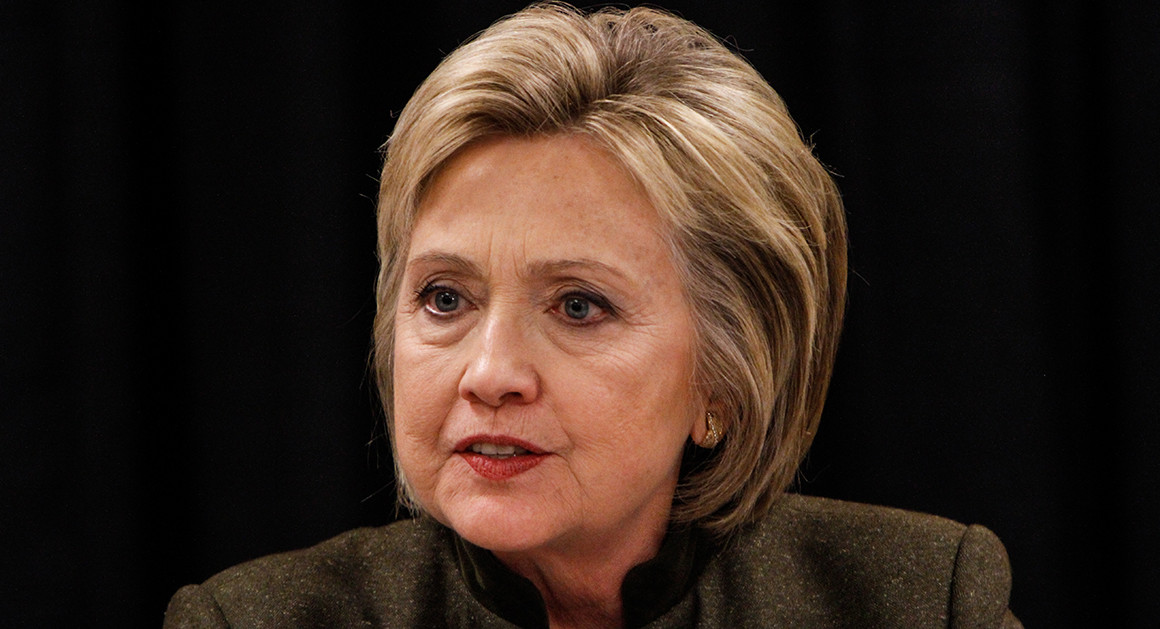
The State Department released a batch of about 550 of Hillary Clinton's emails midday Saturday, making public details of the Obama administration's deliberations about global hotspots such as Libya, Syria and the South China Sea.
The new set of messages also incrementally increased the headache for Clinton's presidential campaign as the State Department classified 84 more messages, bringing the total tally of messages now deemed to contain such restricted information to more than 1,700. None of those messages was marked as classified at the time, but critics say Clinton's use of a private server for her emails risked national security.
While the vast majority of the messages now considered classified are designated at the lowest level—"Confidential"—as closely-held diplomatic communications, State deemed three messages in the latest batch to warrant protection at the more sensitive "Secret" level.
One of those appeared to deal with fallout from the U.S. military and CIA raid that killed Osama bin Laden in Abbottabad, Pakistan, on May 2, 2011. The message indicates that then-Senator John Kerry (D-Mass.) was trying to reach Clinton by phone after a day of intense diplomacy aimed at calming the Pakistani government's anger over the U.S. government's covert bin Laden attack.
"Cameron called me, hysterical," State policy planning chief Jake Sullivan wrote to Clinton on May 16, 2011, referring to U.S. Ambassador to Pakistan Cameron Munter, who accompanied Kerry at high-level talks in Islamabad that day. A phrase in the middle of the email is redacted before Sullivan adds, "That is likely what Kerry is talking about."
"Can you get me the facts (such as they are) before I talk with Kerry?" Clinton replied.
At the time, there were fears that Pakistan would try to keep a stealth helicopter used in the raid and abandoned at bin Laden's compound. There were also reports that Pakistan was giving China access to the remains of the high-tech U.S. chopper.
The other "Secret" messages in Saturday's release relate to a cross-border attack from Egypt's Sinai peninsula into Israel in August 2012 and to views veteran diplomat Dennis Ross shared with Clinton in September 2012 at a time of tension in U.S.-Israel relations. Another copy of that message was released in heavily-redacted form last month.
State announced last month that it has classified 22 messages from Clinton's account as "Top Secret," the highest of the three tiers of protection. However, a State Department official said Saturday that number did not rise in the new batch.
Clinton has vigorously disputed the "Top Secret" classifications and called for those messages to be made public.
Other sensitive messages in the latest batch include a discussion of potential terms for Libyan leader Muammar Qadhafi to step down.
“Tripoli reps insist that he will ‘never’ leave country, but concede that he is prepared to discuss ‘internal exile’. They define this as some form of house arrest, with some honorific title like ‘Retired Leader of Revolution’, under confinement, and ‘out of public eye,’” Deputy Secretary of State Bill Burns wrote in a May 4, 2011 message. “Who could have any confidence in this arrangement?”
No such deal was brokered. Qadhafi was killed in fighting between local forces in Libya in October 2011.
With Clinton’s rival for the Democratic nomination, Sen. Bernie Sanders (I-Vt.), attacking her over her relationship with former Secretary of State Henry Kissinger, the new messages include another indication of their ties.
“Sec. Kissinger…Requested to speak with you and said that the topic was personal,” aide Monica Hanley wrote on June 17, 2012. The message is just one of more than 130 in Clinton’s collection that reference Kissinger.
The latest emails also contain occasional reminders of Clinton’s struggle with technology as well as broader communications issues at the State Department, including officials’ reliance on personal email accounts to do business.
“I'm never sure which of my emails you receive so pls let me know if you receive this one and on which adddress [sic] you did,” Clinton wrote to Sullivan in September 2010.
“Trying to call you thru ops. I never know when my berry phone is working,” Clinton said in a November 2011 email to the same key aide.
The batch of Clinton's emails released Saturday was the smallest one made public since a federal judge issued an order last May setting targets for monthly releases of portions of the trove of roughly 54,000 pages of messages. U.S. District Court Judge Rudolph Contreras' order also required State to complete that process by late last month but the State Department missed that deadline.
A State Department official filed a formal report with the judge Friday night detailing how State failed to circulate more than 7,000 pages of messages for inter-agency review.
State initially proposed making one final release at the end of this month. However, Contreras rejected that plan and ordered State to make today's release as well as further releases on Feb. 19 and 26 before completing the process on Feb. 29.


